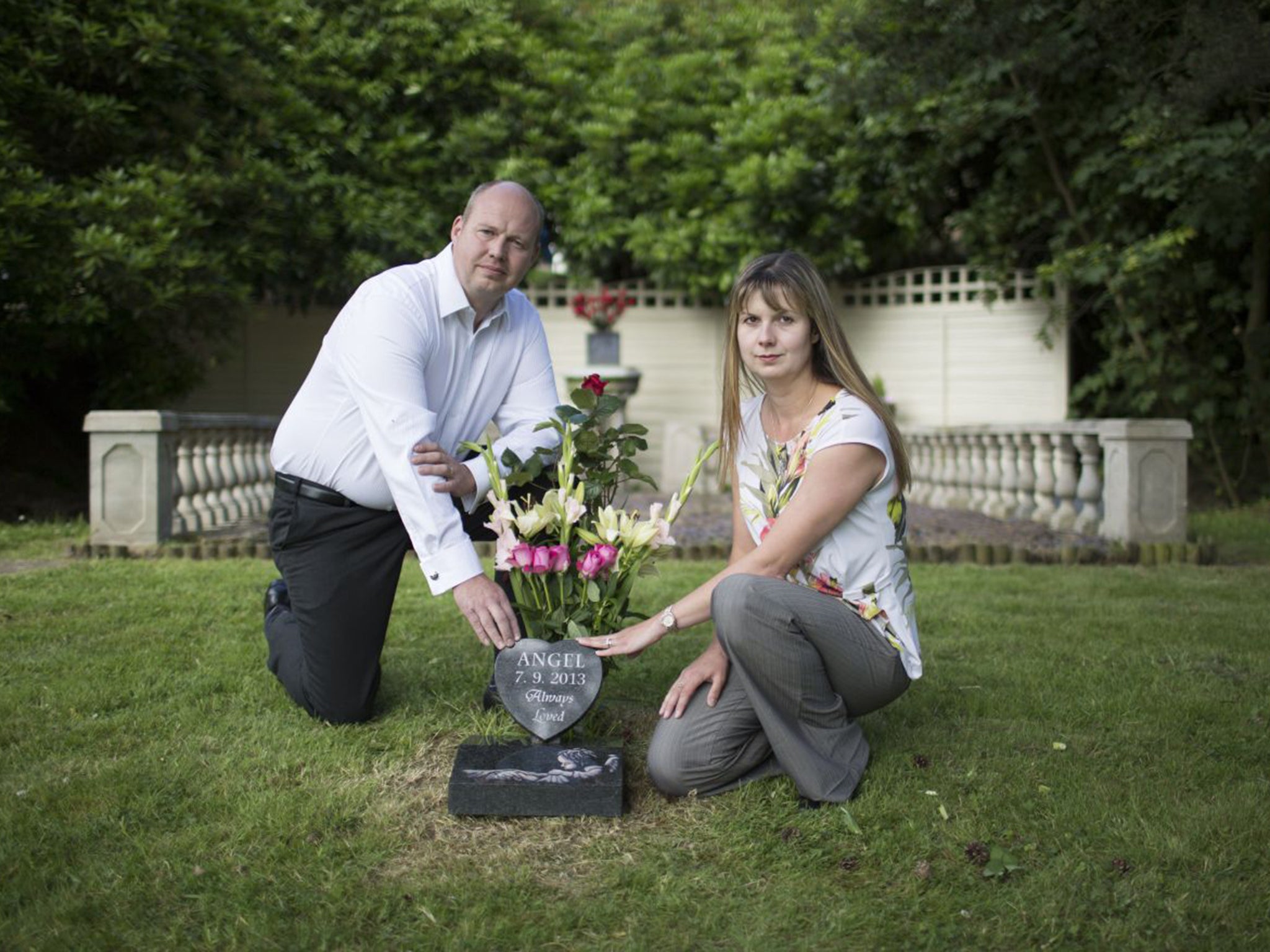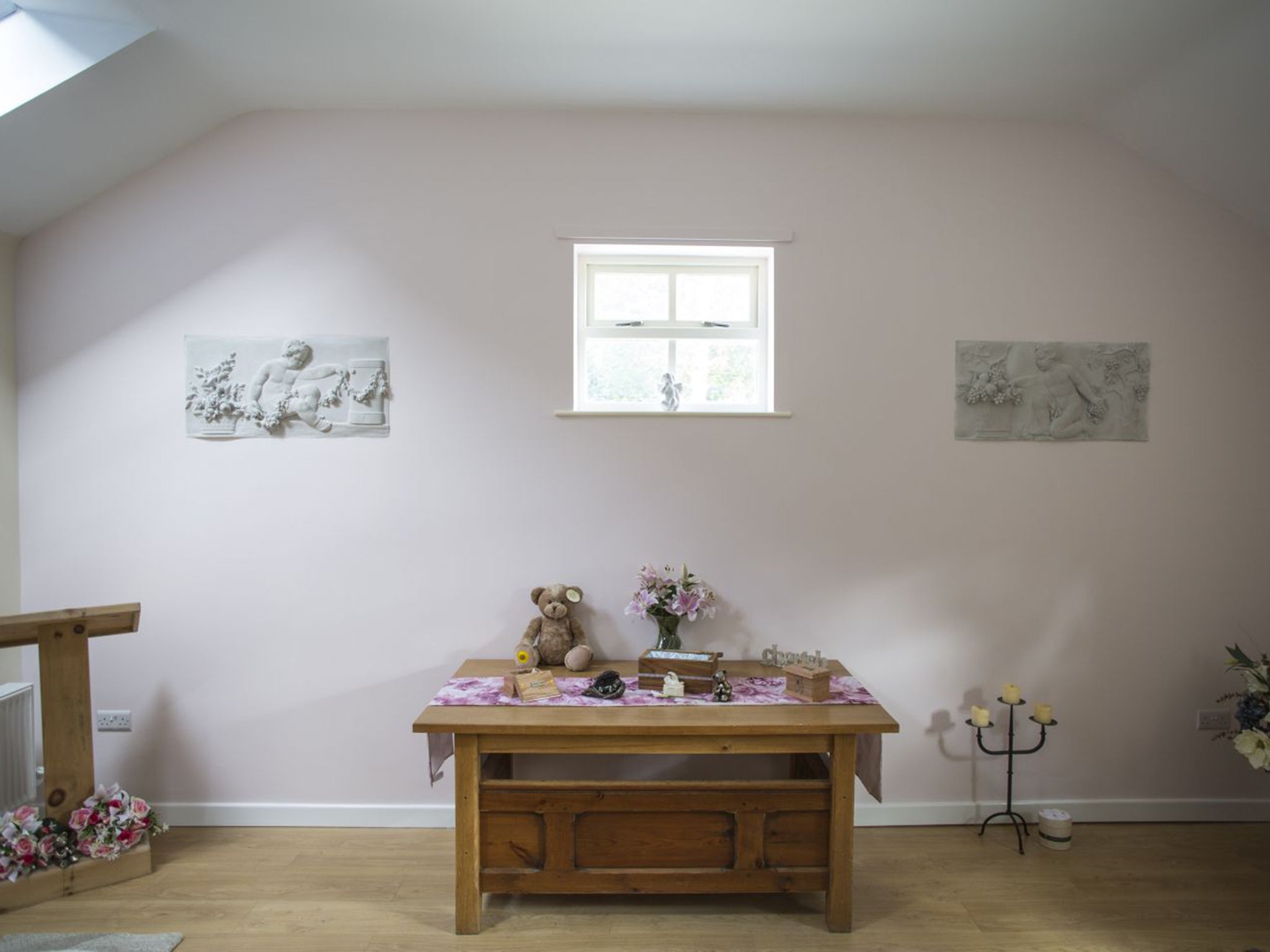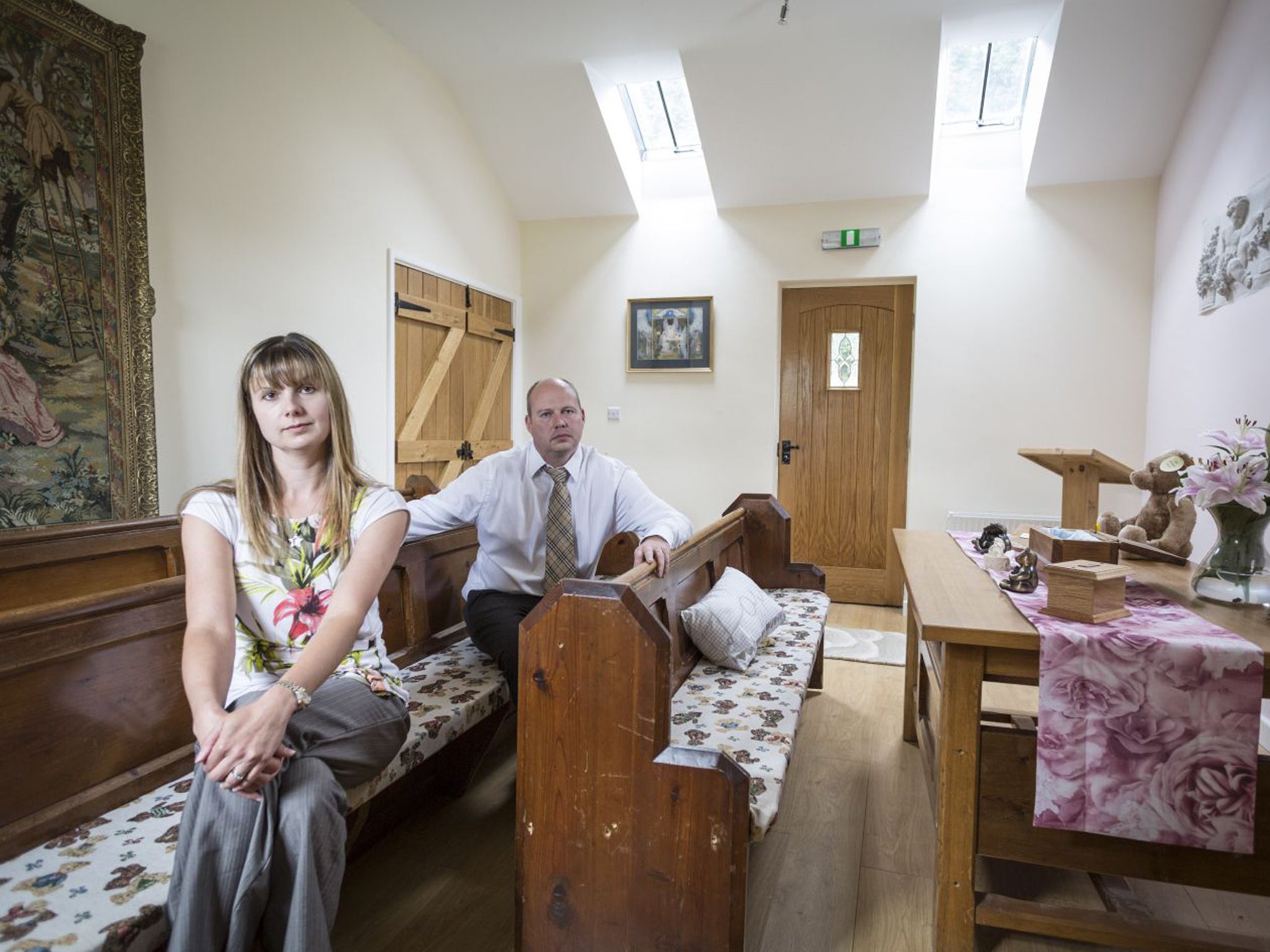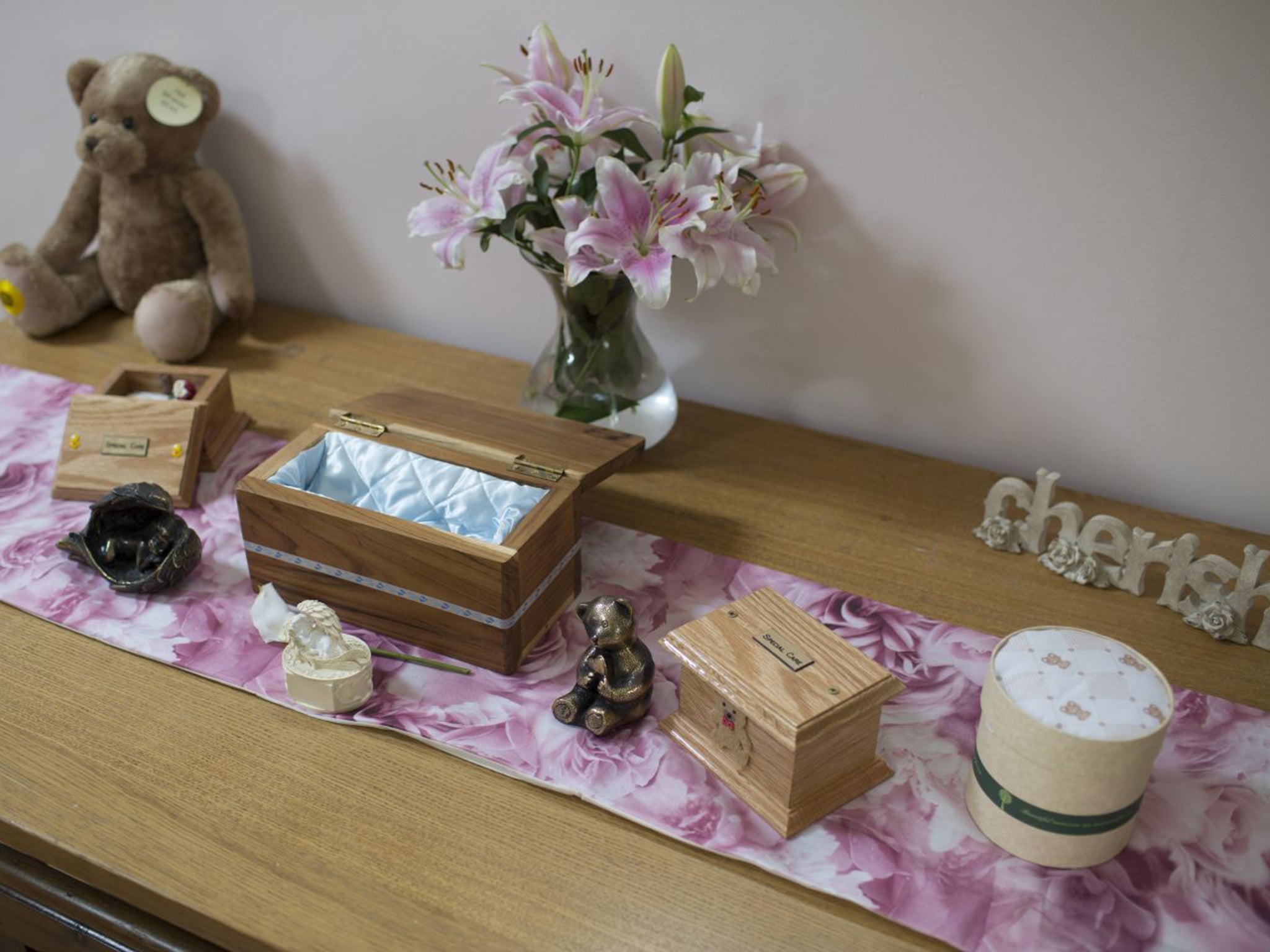In memory of an Angel: How one couple used their experience to lessen the sorrow of other families who lose a baby early in pregnancy
The Walshes have converted their home into the country's first purpose-built crematorium for those who experience miscarriages and stillbirths

Your support helps us to tell the story
From reproductive rights to climate change to Big Tech, The Independent is on the ground when the story is developing. Whether it's investigating the financials of Elon Musk's pro-Trump PAC or producing our latest documentary, 'The A Word', which shines a light on the American women fighting for reproductive rights, we know how important it is to parse out the facts from the messaging.
At such a critical moment in US history, we need reporters on the ground. Your donation allows us to keep sending journalists to speak to both sides of the story.
The Independent is trusted by Americans across the entire political spectrum. And unlike many other quality news outlets, we choose not to lock Americans out of our reporting and analysis with paywalls. We believe quality journalism should be available to everyone, paid for by those who can afford it.
Your support makes all the difference.They named their baby Angel before she died. “I knew there was something wrong from the beginning,” says Jemma Walsh through her tears, in the kitchen of her home in the Peak District. “I began to bleed but they couldn’t see any reason for it. Then we went for the scan at 20 weeks and they said there wasn’t enough fluid, she wasn’t developing right. Her torso was not as big as it should have been.”
Jemma, 32, and her husband John, 40, saw a specialist that same night. “He said, ‘I’m sorry, there is no happy outcome. There is no way this baby is compatible with life.’”
They went back to the hospital in Sheffield a few days later for the pill that would prepare her to be induced, in the knowledge that Angel would die soon after birth. “We went for a scan that day hoping that she wasn’t alive,” John admits.
“She was kicking and stuff,” says Jemma. “The staff were lovely. They let me in through a back door so I didn’t have to go through the room with all the other mums who were waiting for their scans. They said the end would be when the placenta detached, as she would not be able to survive the birth. I felt awful. Guilty.
“There were no other options, though. That didn’t stop the hurt.”

The Walshes have used their experience as a motivation to do something remarkable. They have moved out of their home overlooking Hallam Moor and had it remodelled as the country’s first purpose-built crematorium and chapel of rest for those who have experienced miscarriages and stillbirths.
“I take some comfort from the feeling that Angel has been our guide in this, leading us to where we need to be,” says John, who has invented a new cremater specifically for dealing with individual remains, however tiny. Special Care Foetal Cremations opens on Saturday.
The chapel is already prepared, with oak pews and scented candles. The cushions are decorated with teddy bears, as if it were a nursery. On the table, there are tiny, silk-lined oak coffins the size of jewellery boxes, empty and ready for use.
This place will not be to everybody’s taste, of course. Nor does every woman want to deal with the remains of a lost pregnancy in this way, for very understandable reasons. Stillbirth and miscarriage are terrible things to go through, often made worse by the ignorance and accidental cruelty of those around you. But, for some people, this quiet and beautiful place on the side of a hill will be a source of comfort.
Sands, the stillbirth and neonatal death charity, says: “We know, from over 30 years of supporting bereaved parents, that having ashes that are associated with their baby, however few, to scatter or bury, is of huge significance. Denying bereaved parents this choice adds unnecessarily to their pain and distress and can have life-long effects.”
That was a statement issued after a crematorium in Shropshire was found not to have returned the remains of 51 babies to their parents. Hundreds more have been lost by hospitals and clinics in England and Scotland, it has emerged over the past few years in what has become known as the baby ashes scandal.
There are something like 3,600 stillbirths in Britain a year. But those are just the ones who make it to 24 weeks, when they are treated as babies. There are also around a quarter of a million miscarriages, defined as occurring at up to 23 weeks.
“If you lose a baby after 24 weeks, you have got a birth certificate and a death certificate,” says John. “That baby has got its place in the world, its legal status. You’ve always got a record that something happened. To me, if you lose a baby before that time it is just as significant. There is life. There is also physical matter, however small it may be. It’s important to give those people their baby’s ashes back, too.”
He actually started thinking about this before Angel was even conceived. “I was listening to the radio and there were all these men and women saying they had been told there was no ash or cremated remains to return to them. I couldn’t believe it. I was shocked. I wanted to phone in and say that from my experience, when you cremate anything, there is always something left.’”
His experience was of having run a pet crematorium, dealing with tiny bodies. But he researched the story and found out that what they were saying was true. It still is. Funeral directors around the country routinely say it can’t be done or, if it is, then the integrity of the ashes can’t be guaranteed. That’s if women are given any choice about what happens to the remains of their pregnancy at all.
The Human Tissue Authority (HTA) issued new guidance for health-care professionals in March, stressing that the wishes of the woman should come first – which rather suggests they haven’t been.
She should be made aware of the options available, which include cremation, burial and what is called “sensitive incineration” – where the remains are packaged, stored and incinerated separately from other clinical waste. Campaigners say that is rarely done properly, however.
And even when funeral directors are used, the official HTA guidance warns: “Women should be told that ashes may not always be recovered in the case of an individual cremation.”
This is partly to do with the nature of the equipment, says John. “If you put something so small and so delicate into a full-sized human cremater, the ash will ... go up the chimney and into the crevices, because the floor has often been pitted by the heat.”
His small cremater uses heat-conducting material from the aircraft industry for a smoother floor that does not trap ash. “We were surprised when the patent search showed that this had not been done before.”

Life took a cruel turn as he developed this new piece of technology, when his own wife’s pregnancy ended tragically early. “I had been talking to the lady from the Miscarriage Association professionally a couple of weeks earlier, but now I was on the phone to her again, crying my eyes out and saying it had happened to us.”
The labour took 12 hours. “Obviously she was … dead,” says Jemma. “They took her away to clean her up. They wrapped her up and put her in this little tiny box. John had a good cuddle with her.”
Her husband says, “I held her a lot. She was lovely. Then we had to go. It’s hard to walk out of hospital with a box with a baby in it.”
Angel was placed on a table at their home, in a coffin he had made, with candles around her. “It was awful, but it was a close time for us.” The family came to pay their respects and there was a service led by a Catholic priest. They told their son Daniel what had happened by reading him a book by Pat Schwiebert called We Were Gonna Have a Baby, But We Had an Angel Instead.
It was a while before they could find the strength to launch Special Care Cremations, but they went public with their plans at an industry show, the National Funeral Exhibition, in June. “The reception there was incredible. People were thanking us, hugging us and saying. ‘I wish this had been available when we lost our baby.’”
Some wanted to tell their own stories, says Jemma. “We met one woman who had twins, but one died in utero. The baby attached itself to her internal organs. Because of the complications at the birth, she never saw that baby. It was just whisked away with the clinical waste. She was getting emotional, talking to us.”
Not everyone was supportive. “A few people said, ‘It’s not possible.’ There was one man who works in the cremation industry who wouldn’t bend from that at all,” says John. Is that because funeral directors don’t think it’s cost effective to do it? “I think that would be part of it.”

John and Jemma will charge £395 for a cremation, a handmade coffin and casket, a service and use of the chapel – a tenth of what it costs for an adult. John will collect remains from anywhere in the country for the same price. He also wants to offer the service to NHS hospitals and clinics for a fraction of that price.
Part of the grounds are set aside for the Miscarriage Association, and those who want to will be able to have a plaque there to mark their loss. “Not only has there not been a way to retain the ashes until now, but there has not been anywhere designed for that purpose,” he says.
Angel is buried in a corner of the garden under a small black memorial stone, but this is not a shrine to her by any means. It comes as a shock to see a photograph tucked away in the private office, showing her wrapped up and cradled in her father’s hands, with only part of her showing. “Those are baby Angel’s feet,” he says softly of the tiny red toes. “Even now I sometimes feel guilty how well I have healed. It is part of my life that is in our history, like the day her big brother Daniel was born. I can talk about it now.”
A big part of the healing process was the birth of Hannah, less than a year after their loss. The grief the Walshes felt so deeply has now opened out into the desire to be of use to others, in a way perhaps only they can or would do.
“We are private people. We’re only telling our story now because we think we can offer something that is really needed,” says John. “We thought it might help others if they knew that we had been through something similar with Angel. We want this to be her legacy.”
Join our commenting forum
Join thought-provoking conversations, follow other Independent readers and see their replies
Comments